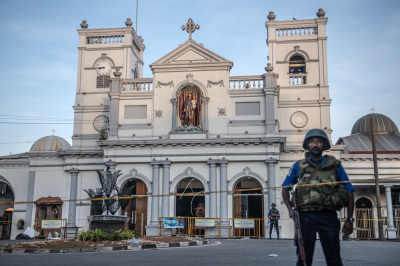Sri Lanka is yet another wake-up call for all of us

I was in the final pass of looking over my Easter sermon when a friend texted me: “Please mention Sri Lanka.” I have made it my practice to not check news or scroll through social media on Sunday mornings, and so I had not yet heard.
As I logged on to see the news for myself, a pit began to form in my gut. The first images I saw were those of churches blown wide open, various remains scattered about, and a statue of Christ sprayed with blood and blast marks. While the majority of us were about to attend our Easter services without fear of persecution or violence, thousands in Sri Lanka had endured the most tragic of days imaginable.
Though my heart sank in grief for those in Sri Lanka, I was also burdened for brothers and sisters in Christ all over the world. I keep a Coptic cross close to me that reminds me to pray daily for persecuted Christians. As I pressed my fingers against it this Easter Sunday, the fresh reminder of global suffering had a somber heaviness. Because, whatever happens to any human being on account of the faith happens to us all. When one part of the Body of Christ suffers, the entire Body suffers with it (1 Corinthians 12:26).
Religious persecution and violence towards others on account of their faith represent the deepest levels of human evil. There have been more Christian martyrs globally in the last one hundred years than in the previous nineteen hundred years combined. Open Doors USA estimates that every month, on average, 345 Christians are killed for reasons related to their faith. In addition, more than 100 churches are burned or attacked monthly, and more than 200 Christians are imprisoned with no due process.
We have since learned that the coordinated Easter Sunday bombings in Sri Lanka were the product of radical Islamists intending to kill primarily Christians. But Christians are not the only people of faith targeted around the world. Sri Lanka is yet another sickening chapter in the larger story we’ve seen far too much of late including: the burning of three African-American churches in Louisiana, the mass shootings at two mosques in New Zealand, and yet another mass shooting at a synagogue in Pittsburgh last year. Such attacks on any religious group or person ought to be condemned by all people in general, but especially all people of faith.
This is an area where American Christians, including myself, have much room for improvement. We have often expressed anxiety that secularization of our own culture creates significant threats to Christian religious liberty, and perhaps even to Christians themselves. At the same time, however, many of us have failed to recognize that the denial of freedom to any human being on account of their religious beliefs is a danger to every person of faith. If the Buddhist or Muslim is denied the same religious freedom and protection afforded to the Christian now, the Christian ought to not be surprised when it happens to him or her in the future.
To be clear, it’s not that American Christians do not care about the persecution of people around the world. It’s just that most of us have very little personal experience with it.
We Christians need to deepen our understanding and empathy towards the oppression and suffering faced by millions around the world, but we’re not the only ones. Americans in general frequently seem to live with an overall disconnect regarding global realities.
Sadly, Easter Sunday demonstrated this clearly. It did not take long for the Sri Lankan’s tragedy to become an opportunity for politicians and pundits to start taking their swipes at each other. Only hours after our own Easter services had concluded, more than one American mainstream media outlet had returned to their coverage of the Mueller report as the lead story. Not surprisingly, our social media did not fare any better. The Sri Lankan government had to block their citizens’ access to multiple American-generated sites because of the proliferation of false news stories.
Thankfully, we as Christians need not look far to find a solution. The answer is in the meaning of Easter itself. Through his death and resurrection, Christ struck a fatal blow to evil and death. As a result, he is in the process of redeeming, restoring, and reconciling all that has gone awry back to himself. As Christians, we are called to join the Risen Christ in the same work.
Ours is both a call to prayer and a call to action. Pray for the persecuted around the world daily, even when religious differences exist. Mourn with those who mourn and rejoice with those who rejoice. Stand in solidarity with those who suffer and refuse to allow any religious persecution or exploitation to go unchecked. If we desire freedom and justice for ourselves, we must demand it for others. If we fail to stand with the oppressed, we can easily become the oppressors. Instead, we can proclaim with courage and confidence that our God cares for all who are persecuted.




















